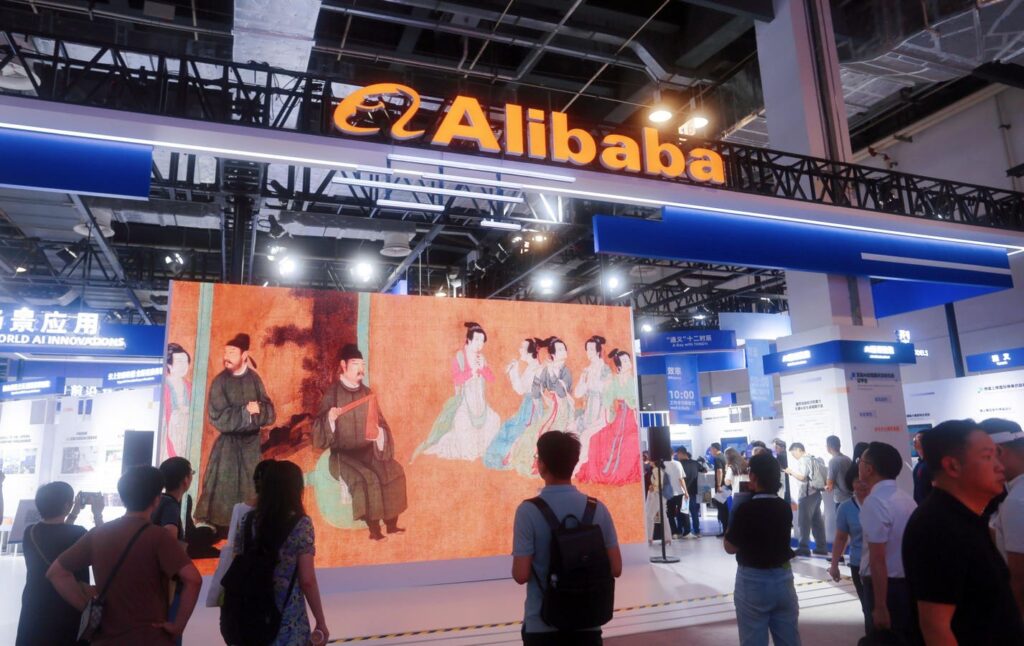Visitors visit the Alibaba exhibit area at the WAIC World Artificial Intelligence Exhibition. … [+]
Chinese e-commerce and cloud giant Alibaba's shares have performed poorly this year, rising just 1% since early January, compared to a robust 27% rise in its U.S.-based peer Amazon over the same period. The company is under pressure from several factors, including a slowing Chinese economy and growing competition from e-commerce startups. That said, we think the stock is attractive given its reasonable valuation and growth potential in areas like artificial intelligence.
China's economic growth is weak, with GDP slowing to just about 4.7% in the second quarter of 2024 from 5.3% in the first quarter. This is due to the country's slow recovery from a sluggish real estate market and a strict COVID-19 lockdown that ended more than a year ago. Moreover, consumer and domestic consumption also remain weak in China. Retail sales recently fell to an 18-month low due to deflation as companies cut prices, employers cut salaries, and youth unemployment remains high at about 14% in May. Moreover, Alibaba is facing increased competition in the e-commerce sector, with PDD, which owns discount e-commerce platforms Pinduoduo and Temu, gaining share as Chinese consumers become more price-conscious due to the weakness of the economy. In the fourth quarter of fiscal 2024, the company's Taobao and Tmall online marketplaces' revenue rose about 4% year-on-year to 93.2 billion yuan ($12.9 billion). Alibaba's cloud-computing business has also seen growth slow considerably, with revenue growing by just 3% in the most recent quarter. The slowdown is due to reduced demand for computing power linked to remote work, remote education, and video streaming after the coronavirus lockdown. U.S. restrictions on exports of advanced semiconductor chips may also have had some impact on the business.
BABA stock has plummeted 65% from $235 in early January 2021 to around $80 currently, while the S&P 500 has risen roughly 50% over the past three years. Notably, BABA stock has underperformed the overall market over the past three years. The stock has returned -49% in 2021, -26% in 2022, and -12% in 2023. In comparison, the S&P 500 has returned 27% in 2021, -19% in 2022, and 24% in 2023. BABA underperformed the S&P 2021, 2022, 2023. In fact, Consistently outperforming the S&P 500 It's been a tough time for individual stocks in recent years, with good times and bad. It's been tough for big names in the consumer staples sector like WMT, PG, COST, and even large caps like GOOG, TSLA, and MSFT.
In contrast, the Trefis High Quality Portfolio, which holds 30 stocks, Outperforming the S&P 500 every year During the same period. why is that? As a group, the HQ Portfolio stocks offered better returns with lower risk compared to the benchmark index. There was less rollercoaster volatility as evidenced by the HQ Portfolio performance metrics. Given the current uncertain macroeconomic environment, high oil prices and high interest rates, BABA may face similar conditions in 2021, 2022 and 2023. Underperforming the S&P Will we see a recovery over the next 12 months?
The regulatory troubles Alibaba faced in 2021-2022 related to its affiliate Ant Group, a major digital payment services company, appear to be a thing of the past. Alibaba is also fine-tuning its e-commerce strategy to make it more similar to value-focused players such as Pinduoduo. Alibaba's valuation is also attractive. At a current market price of about $78 per share, BABA stock trades at less than 9.5 times expected earnings, which we view as very reasonable given the company is likely to achieve high single-digit growth rates over the next two fiscal years. Alibaba has also doubled down on its share buybacks, spending about $5.8 billion to repurchase 77 million American Depositary Shares during the quarter ended June 2024. Alibaba's overall valuation compares much more favorably with US e-commerce giant Amazon, which trades at about 42 times expected earnings and has slightly higher near-term revenue growth forecasts. While risks for Chinese stocks are typically high given potential regulatory and political concerns, we believe such a large valuation gap is not justified. Additionally, Alibaba is seeing growing demand for artificial intelligence-related products within its cloud division. The company said AI-related revenue grew triple digits in the most recent quarter, making it likely that AI will provide some upside to overall growth. Alibaba's rating At roughly $107 per share, the stock represents a 37% increase from the market price of roughly $78 per share. Alibaba's Revenues Learn more about how Alibaba's revenue is trending.
Comparison of BABA returns and Trefis enhanced portfolio
Invest Trefis Market-beating portfolio
See all Trefis Price quote


